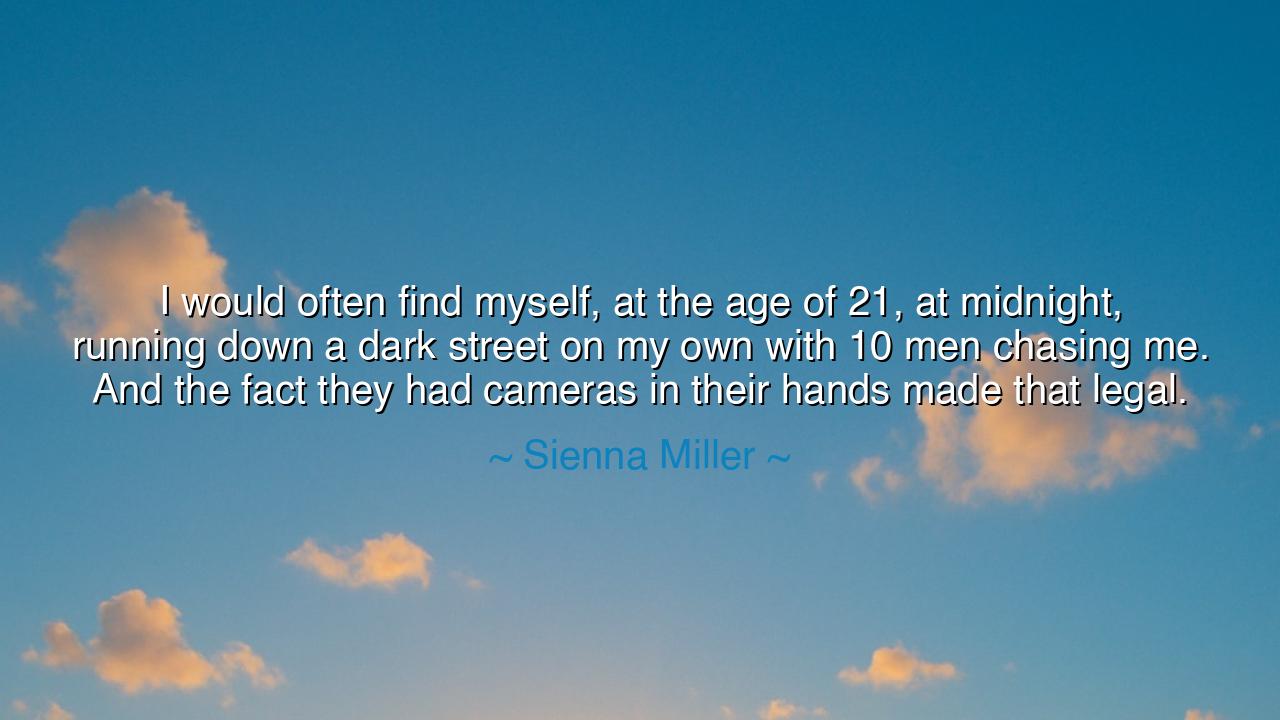
I would often find myself, at the age of 21, at midnight, running
I would often find myself, at the age of 21, at midnight, running down a dark street on my own with 10 men chasing me. And the fact they had cameras in their hands made that legal.






There are cries in the night that no one hears — not the sound of pain, but the quiet agony of being hunted in plain sight. When Sienna Miller said, “I would often find myself, at the age of 21, at midnight, running down a dark street on my own with 10 men chasing me. And the fact they had cameras in their hands made that legal,” she spoke not only of her own suffering, but of the deeper wound within our age — the loss of privacy, dignity, and humanity in the face of a society that confuses curiosity with entitlement. Her words are a lament and a warning: that when the law defends intrusion, innocence is no longer protected, and freedom becomes a spectacle for profit.
The origin of this quote lies in Miller’s early years of fame, when she became a target of the paparazzi — a relentless swarm of photographers who stalked her through the streets of London and New York, flashing cameras in her face, waiting outside her home, and chasing her through the night. To the tabloids, she was not a woman, but a commodity. To the law, their pursuit was “legal”, shielded by the guise of journalism and free speech. But to her, and to any soul with decency, it was a violation — a theft of peace, a desecration of personhood. In speaking these words, she was not merely describing fear; she was unmasking a society that had mistaken legality for morality, and spectacle for truth.
There is an ancient echo to her struggle, for the human heart has always been vulnerable to the gaze of the crowd. In Rome’s Colosseum, the masses gathered to watch men and beasts destroy one another, believing that violence, when sanctioned by the empire, was entertainment. The law declared it acceptable. The people cheered. Yet even then, a few voices rose in protest — philosophers and poets who saw the cruelty behind the cheers. Sienna’s chase through the midnight streets is but the modern version of that same cruelty. The arena has become the street, the sword replaced by the camera, and the hunger of the crowd remains unchanged. What was once bloodlust has become voyeurism — the endless appetite to witness, consume, and discard the lives of others.
Her words reveal the paradox of modern civilization: that technology has outpaced empathy, and legality has outpaced conscience. To call such persecution “legal” is to expose the weakness of the law itself — a system that protects property and profit more readily than it guards peace of mind. The camera, in her story, is both weapon and shield — a weapon in the hands of those who wield it without compassion, and a shield for those who justify their cruelty through the law. It reminds us of the ancient philosophers’ warning: that law without virtue becomes tyranny in disguise. The law, like fire, was made to serve humanity — but when misused, it devours the very world it was meant to protect.
Her experience also carries the scent of tragedy — the loss of innocence that fame so often brings. At twenty-one, an age when many are still discovering the joy of freedom, she was forced to live as prey. Fame, which should have been a crown of achievement, became a chain of exposure. The young actress, full of life and talent, found herself sprinting through darkness — not from enemies of war, but from men with cameras, from the machinery of curiosity, from a culture that treats lives as stories to be owned. It is a haunting image — a woman running not from danger, but from the legality of dehumanization.
Yet in her pain, there is also a revelation of courage. For Sienna Miller did not remain silent. She stood before courts, before governments, before the press itself, and demanded that the powerful look upon their own reflection. Her testimony helped fuel the Leveson Inquiry in the United Kingdom, which exposed the corrupt intimacy between tabloids, paparazzi, and political power. In this act, she transformed her suffering into purpose — proving that truth, when spoken boldly, can restore humanity to even the most corrupted institutions. Her defiance was not vengeance, but reclamation — the ancient act of turning pain into principle.
And so, from her words, a lesson must be drawn — one that reaches beyond the glitter of celebrity. The freedom of the press is sacred, but so too is the sanctity of the individual. To violate one in defense of the other is to destroy both. Let us remember that what is legal is not always what is right, and that the dignity of the human soul must never be sacrificed on the altar of entertainment. Every generation must guard against the slow erosion of compassion by convenience, of empathy by curiosity. For when the law allows us to chase, to invade, to humiliate in the name of profit, then civilization itself begins to run — down a dark street, breathless, with no one left to defend it.
Thus, let her words echo like a warning through the ages: the power to see must never become the power to destroy. And may all who hear her story learn that to honor another’s privacy is to honor the sacred boundary between humanity and its shadows.






AAdministratorAdministrator
Welcome, honored guests. Please leave a comment, we will respond soon